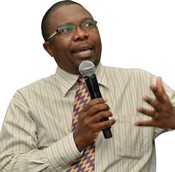A Story of Elephants
FEATURED PAPER
By Pascal Bohulu Mabelo
Johannesburg, South Africa
Whenever phrases associated with infrastructure in Africa ring in one’s ears, some distasteful thoughts are evoked of generous investments and efforts that have failed to produce “beneficial changes” in our impoverished communities. Thus, this poem of chagrin, a song of a failed victory would come to mind:
Broken Pedestal For The General …
In a far island of old, wedged between continents of three,
A mighty General once lived, both feared and free,
Graceful garb and fierce face made all pause,
His dealings ruthless, he bade no pity nor cause.
His true name forgotten, known only as “The General”,
Famed for his victories, undefeated, always in control,
In every battle fought, by land or sea, he emerged the cold victor,
His peers admired him, therefore, his annals no one could doctor.
But when he passed, on his resplendent tomb of marble, an odd phrase was etched,
“Herein lies ‘The General’, who never lost a fight, but never won a war”, it stretched,
How could he, whose name spelt fright, win every battle and yet not a single war?
For greatness, it seemed, he chose battles in manner indecent men pick a whore.
Choosing the wrong battles, can lead to defeat’s resounding might,
A myopic focus, he failed to discover, with only an enemy’s flag in sight,
The story of “The General”, echoes of many a project manager’s plight.
That winning each skirmish, though a glorious feat,
Without a grander plan, the war he couldn’t beat,
Though winning every battle may bring accolades and fame,
Without a grand strategy, the war may still remain the same.
“The General” epitomises project managers involved in Large Infrastructure Projects across Africa; they have delivered so many projects, but only a few have assisted in conquering our socio-economic woes. We must understand that infrastructure is a “technological system” that is nested in a “socio-economic system”—therefore, it ought to positively affect the safety, quality of life, and wealth of the community.
The Organization for Economic Cooperation and Development maintains, “Infrastructure creates value when it contributes to addressing social needs or facilitates economic activity. Choices regarding infrastructure development must therefore be focused on user [and other stakeholders’] needs” (OECD, 2017). The U.S. Department of States expressed similar sentiment five years earlier:
“Investments in modern infrastructure lay the foundations for economic development and growth. Building roads, bridges, power transmission lines and making other improvements create jobs. When completed [to the satisfaction and benefits of relevant stakeholders], these projects help a society increase its wealth and its citizens’ standard of living.” (U.S. DoS, 2012)
Two important messages are noted here: (i) The works involved in delivering infrastructure result in job creation; e.g., the Daxing Airport (Beijing, China) created 40,000 direct jobs during construction; and (ii) when completed, modern infrastructure projects should increase the wealth (of the nation) and standard of living of citizens. It stands to such reasons that African countries should be gearing themselves up to deliver Large Infrastructure Projects along the WETWITS themes, as one has coined it (Mabelo, 2021):
(1) Water systems; (2) Energy systems; (3) Transportation systems; (4) Waste treatment systems; (5) Information technology [IT] systems; (6) Telecommunications systems; and (7) Social facilities (e.g., hospitals, schools, shopping centres, arenas)—Hence, the thematic acronym: WETWITS.
No other continent on the entire planet needs these types of infrastructure, in number and in spread, as does Africa currently; the choice is ours to embrace this as a huge opportunity or an ill-fated mission. Our seemingly daunting challenges, when considered from a positive and inspirational perspective, will rather suggest “opportunities”. Indeed, we still have so many rivers for first-class bridges to span on; so many school and hospital systems yet to be built in rural communities; so many roads to be developed in our glamorous landscapes; so much agricultural produce, oil and gas, and other minerals waiting to be extracted from the ground. Further, there is so much green-clean power to be harnessed from the Grand Inga Dam sites in DR Congo and distributed inexpensively across brotherly African communities spreading from Cape Town to Cairo, from Dakar to Dar-es-Salaam, and from Abidjan to Addis-Ababa.
More…
To read entire paper, click here
How to cite this paper: Mabelo, P.B. (2023). Infrastructure for Africa – A Story of Elephants; PM World Journal, Vol. XII, Issue VIII, August. Available online at https://pmworldlibrary.net/wp-content/uploads/2023/08/pmwj132-Aug2023-Mabelo-infrastructure-for-africa-a-story-of-elephants.pdf
About the Author

Pascal Bohulu Mabelo
Johannesburg, South Africa
![]()
Pascal Bohulu Mabelo, MBA, MSc (Industrial), BSc (Civil), Pr. Eng, Pr. CPM, Pr. PMSA, PMP, has more than 25 years of professional experience and possesses a wide range of technical and managerial skills pertaining to large and complex infrastructure projects. He has worked in large infrastructure projects as a design engineer, project/programme manager, project consultant and project management executive. Pascal was honoured to serve as the national chairman of Project Management South Africa (PMSA), the leading Project Management professional association in Southern Africa.
Pascal has published the book: “Managing Engineering Processes in Large Infrastructure Projects” (2021); he has also published, “How to Manage Project Stakeholders—Effective Strategies for Large Infrastructure Projects” (2020) and “Operational Readiness—How to Achieve Successful System Deployment” (2020). Through various other publications, he assiduously promotes the application of Systems Thinking and/or Systems Engineering principles and concept to unravel complexity in Large Infrastructure Projects (LIPs) in order to address their persistent risks of failure and their massive, even pernicious, cost and schedule overruns.
Pascal is currently a Director and Principal Consultant at E 6 Project Consulting (Pty) Ltd or E6PC; for any comments, further information, and clarifications he may be contacted at Consult@e6pc.com









